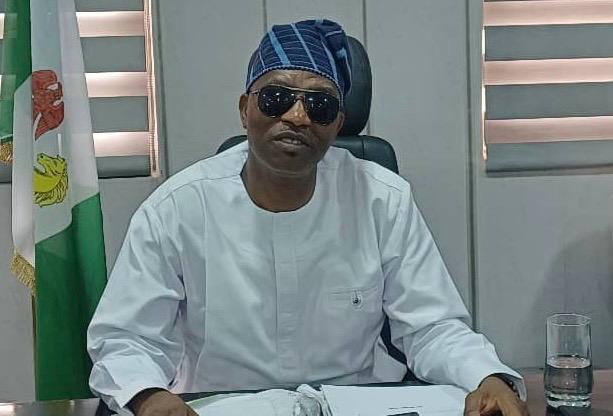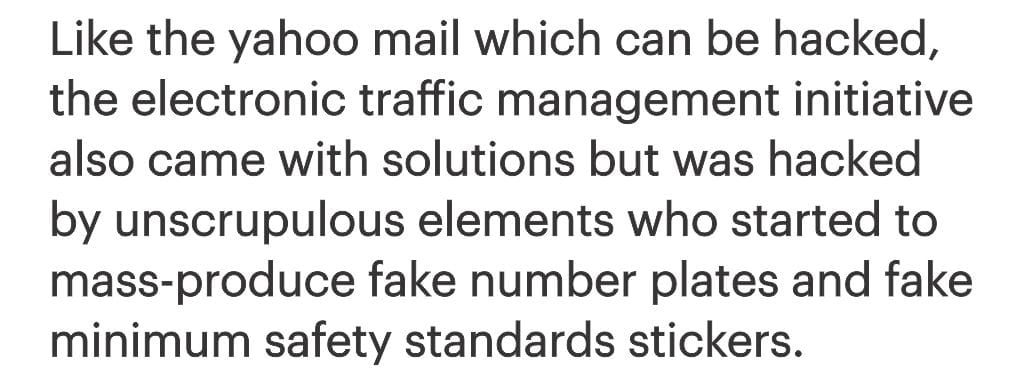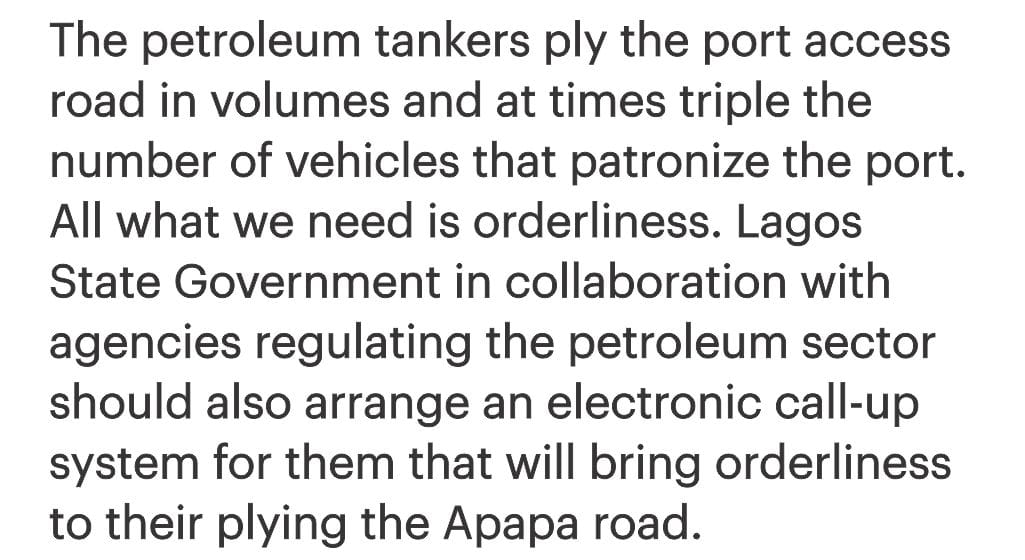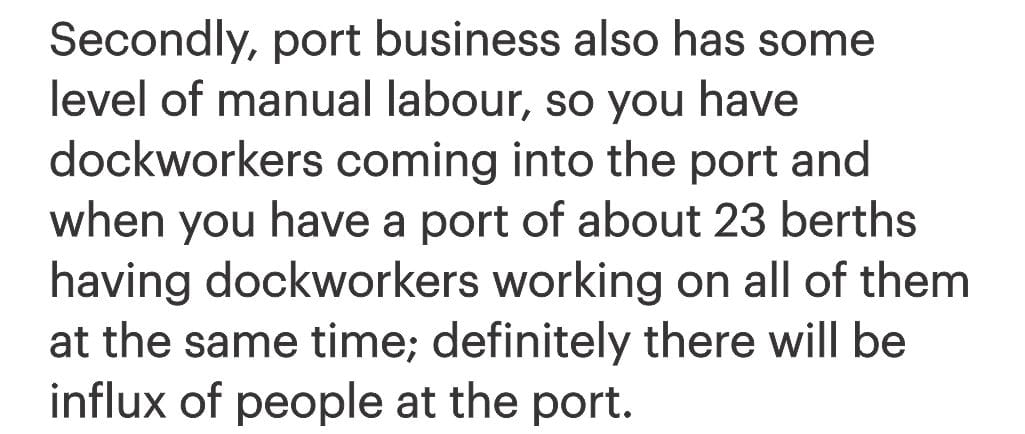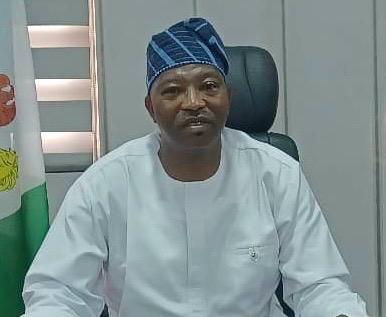The Port Manager of Nigeria’s largest seaport, Lagos Port Complex Apapa, Mr. Charles Okaga, has identified multiplicity of regulatory agencies “doing almost the same work”, manual examination of cargoes by Customs due to lack of scanners and poor access roads as some of the challenges hampering efficiency at the port.
Speaking in this interview with SHIPS & PORTS’ Abolanle Oluwatola, Okaga, who assumed duty as Port Manager of Nigeria’s largest seaport in June 2023, also lamented the activities of unscrupulous elements who recently hacked into the electronic call-up system for trucks using the port. He said the hacking of the e-call up system, also known as eto, contributed to the challenges of managing traffic congestion on the port corridor.
Excerpts:
Is there efficiency in the handling of cargoes at your port?
Port efficiency is measured by the interaction of factors like available space, plants and equipment, berthing spaces, speed at which vessels are brought in and taken out of the port and the level of automation employed. The smooth interaction of these factors leads to good turnaround time of vessels and improved dwell time of cargoes at the port. Generally, with the turnaround time of vessels, which is substantially under the control of the Nigerian Ports Authority, I would say yes, there is efficiency in port services.
Within the limits of what it should be, the turnaround time of vessel has maintained an optimum efficiency level because we have different types of cargoes in the port namely the general cargoes berth, container berth as well as industrial berth. The efficiency coefficient of these respective heterogeneous functions of the port is different. For the container terminal, we have a turnaround time of a maximum of two days, which is fairly competitive given the regional level. For the bulk terminal, we have about five days turnaround time depending on the size and volume of vessels and for the general cargoes, we have a turnaround time of averagely seven days. When you look at all of these within the available infrastructure and superstructures that are required for port operations, you will say that the port is efficient.
What are you doing about alleged attempts to sabotage the electronic call-up system?
Generally, the introduction of Information and Communication Technology came with several challenges even before its introduction into port operations. Like the yahoo mail which can be hacked, the electronic traffic management initiative also came with solutions but was hacked by unscrupulous elements who started to mass-produce fake number plates and fake minimum safety standards stickers. These items are uploaded into the eto platform and when they use these fake numbers to get tickets for call-ups, they sell to people who are outside of the electronic platform arrangement who in turn come to the port because the ticket gives them access to the port. Meanwhile, the electronic platform is arranged in such a way that it has some dedicated parks where trucks are supposed to emanate from unto another group of pre-gate facilities where trucks are supposed to eventually enter into the port. So, these enemies of our country and port productivity get these tickets and move trucks into the system. This disrupts the overall arrangement and leads to gridlocks but since the discovery of large cache of these numbers by the management, we have witnessed a fairly improved traffic situation and the gridlock has drastically reduced. A lot of these people also approach the port access road without any form of call-up. They just park, waiting for businesses, so all of these happen and we are trying our best to mitigate the incidents.
What measures have you put in place to deal with this issue?
To clear the situation, we have suspended bookings of tickets on the eto platform so as to clear the backlog of what we have in the pre-gate and in other areas. By so doing, we have gained control of the traffic situation and the control of the road. The crackdown on recovery of over three hundred fake plate numbers was also a major mitigating factor to illegal trucks finding their ways unto the port electronic platform. We also did a clearing exercise of the pre-gate to ensure that what we now have in pre-gate is in line with the productivity level of the port. So, if the port on a daily basis handles 600 trucks of various categories, the maximum number of trucks we have at our pre-gate is just 600. So, as a truck goes to the pre-gate, it is also able to come out of the port within a space of 24 hours. Also, we have capped bookings. We say okay, you cannot book more than x number on a daily basis for both the parks and the pre-gates unlike before when bookings were not controlled. We also carry out enforcement of the queuing principle. What we have done now is that for every truck that is not its turn to go into the port but finds itself on the port corridor; it has to maintain the queue. Even if it is the truck’s turn and the weight of taking it in at the terminal end is not matching the rate at which the trucks are coming from origin, we now put all of them on one lane. The second lane of the port is a lane that must be moving at all times so that it can serve as a temporary holding lane for trucks and other businesses. Other road users can then have access to the road. I am sure in the past two weeks, you have enjoyed a fairly approachable Apapa road particularly when you are coming from Ijora to Wharf Road axis.
What are you doing about dilapidated quay aprons and common user facilities in the port?
Well, the port is not generally dilapidated. It is just around berth 6 and 7 that you have the quay structure failing because of underwater erosion. So, what the Nigerian Ports Authority is doing at the time is that we have outsourced an important engineering underwater company to carry out integrity test of the entire quay wall because this is a condition that is precedent. So, it is after the integrity test is carried out and concluded that we would know the extent of corrosion, erosion and then engineering solutions will be proffered to those areas where you have the issues. Also, one of the matters that was on ground was the issue of the dilapidated state of some portion of port common user facilities which by the grace of God has since be awarded and the job is about 80 percent completed. So if you go to that particular stretch of road which is 1.6 kilometers, from the roundabout to the control tower, I can assure you that you will see that a lot has been done and since then, we have had improved productivity and a drastic reduction in incidents associated with failed portions of the road within the port.
What is the permanent solution to Apapa gridlock?
Importantly, we need the cooperation and buy-in of all stakeholders. We need every stakeholder to accept the fact that the population of Lagos, when the roads were built, is not the same as it is now. The size of the infrastructure has remained the same while usage has increased. The call for and attraction of businesses to Apapa has increased. The port haulage and freight business are struggling for the use of the road that was constructed strictly for port businesses. The petroleum tankers ply the port access road in volumes and at times triple the number of vehicles that patronize the port. All what we need is orderliness. Lagos State Government in collaboration with agencies regulating the petroleum sector should also arrange an electronic call-up system for them that will bring orderliness to their plying the Apapa road. We also need the consistent maintenance of this road because if you go to Wharf-Ijora, the SIFAX area road is in a serious state of dilapidation and during the rains, we have a higher number of accidents occurring in this area, especially cases of fallen trucks that are resultant from the bad condition of the road. So, if all of these are done, with the stakeholders’ cooperation without people struggling to bypass the system, I am very sure that the traffic will be well managed. All we need is discipline on the part of stakeholders, respect for the rule of law, cooperation from other government agencies, cooperation form the tanker drivers and we would have a better Apapa traffic environment.
What do you consider as major impediments to port operations in the country?
Most of our ports are river ports so the distance between the sea and the port is so long that the cost of bringing vessels would always be higher than a port that is situated near the sea. We also have multiplicity of regulatory agencies doing almost the same work. These are some of the things that have impacts and effects. We also have infrastructural deficits. For instance, we don’t have sufficient scanners, no fixed scanner in any of our ports. Funding is also another issue. All these infrastructural gaps will require a lot of funding to be able to bring our ports to international standards and best practices.
What are the challenges you encounter in your line of work as Port Manager?
The most significant of the challenges is the issue of traffic management around the port. It is of a very great challenge. We have been doing our best to see what to do to nip it in the bud. Generally, power supply is also a challenge because the amount of money that we expend on alternative source of power, which is mainly generating set, impacts on port expenditure and creates a great difficulty in the management of resources. If we have continuous supply of power, I am sure that the problems that we are having would not be as high as it is. Jurisdictional conflict between the Port Police and the State Police Command is another issue that shows that there is an extent to which you as a port management official can even have control over what is happening along the port access road that has a direct impact on your productivity.
What are you doing about the influx of people at the port?
There is strict security check but generally, it is going to be a national solution to a port through the institution of a port community system. When you have port community system where everyone interacts through a common electronic platform, it will automatically reduce the number of people in the port. Secondly, port business also has some level of manual labour, so you have dockworkers coming into the port and when you have a port of about 23 berths having dockworkers working on all of them at the same time; definitely there will be influx of people at the port. Also, because we still do physical examination of cargoes, you cannot be opening up my container in my absence; my agent must be there to witness what is opened and confirm the integrity of what is contained in my container. So, all of these will definitely attract people to the port and where people are working at the rate they are working, they must feed so you have pockets of canteens around to meet the needs of the people. Also, you have huge number of government agencies that are operating in the port and you will not stop them from bringing in their workers and what have you. I am sure that if we are able to streamline the number of government agencies, automate fully by having a port community system through electronic interactions, then there will be a reduction in the number of people coming into the port. However, our security men are up and doing with their daily checks of people entering the ports.
What is the purpose of the staff motivation program you set up at the port recently?
The staff motivation program is a derivative of the performance policy of the Nigerian Ports Authority, which is anchored on reward-based performance. So, we have that omnibus slang that as an Authority, it is a policy. What we have just done here is to ensure that we make the workers feel that policy outside of regular promotion and payment of bonuses at the end of the year. We decided to celebrate outstanding performances and by so doing, the intention is to stimulate other workers to emulate the reward and the celebration that goes with hard work. Since its commencement, we have witnessed unparalleled level of commitment by our staff. Today ordinarily, if you get to various offices, they will be empty but our staff are here. In fact, the in-house unions have also appealed that we increase the category of the motivation which is an indication that the workers are happy that something of this nature has started and they want it cascaded. They want us to now put it in categories so that more workers can benefit.
What are your personal experiences working in Nigerian Ports Authority?
My experience in NPA is a great one. I am one of the fortunate officers. NPA has exposed me to several trainings. I have worked with several committees. I remember when the ISPS (International Ship and Port Facility Security Code) came about and I was made the Regional Secretary for the compliance in the whole of West and Central Africa because the West and Central African countries wanted to carry themselves together in the compliance process. I have also been a member of the review committee of Customs and Excise Management Act; I have been privileged to be a member of the Cabotage Review Act and so on. The experience I have had in NPA is that of capacity building, having worked in several offices including working as a Technical Adviser to the Managing Director on Marine and Operations until my present posting as a Port Manager. A Port Manager posting is actually a career posting. As you grow on the job, your track record, dedication and how much you apply yourself to the job are being checked by the system and when the vacancy is there, you can always be referred. I can’t really remember any bad experiences in NPA. As a worker, you may have one or two reprimands from your boss; I do not see that as a bad experience but a way to make you better. Most recently, Nigerian Ports Authority won the overall medals table in the recently concluded Federation of Public and Civil Service Game where I led the team to that event. It has all been good stories all along and good testimonies.
Copyright Ships & Ports Ltd. Permission to use quotations from this article is granted subject to appropriate credit given to www.shipsandports.com.ng as the source.
